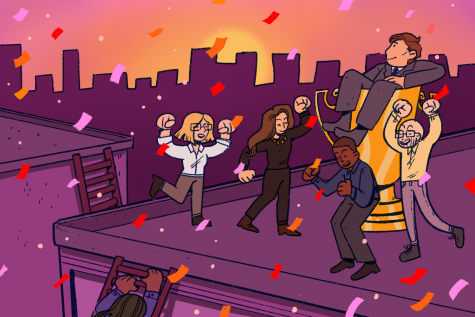Columbia’s newly tenured faculty share ‘exciting, complex and challenging’ experiences
March 31, 2021

In thinking about her path as an educator, Anne Libera said it feels great to have achieved tenure and be recognized by the college. Libera is one of five newly appointed associate professors who were added to the college’s tenured faculty ranks in March.
The other faculty members who received tenure are Kubilay Uner, Olga Goldenberg, Christopher Arnold and Robert Hanserd.
In a March 15 email, the Office of the Provost stated, “Achieving tenure is a significant career milestone and an intensive and rigorous process that [usually] occurs over a six-year period in which faculty candidates are assessed by many individuals.”
Libera, soon to be an associate professor and director of Comedy Studies in the Theatre Department, said the tenure process was exciting, complex and challenging.
“I was up for tenure originally [when] my 16-year-old daughter was diagnosed with cancer,” Libera said. “She died about a year and a half ago. I had to delay in my tenure, … so it’s been a long and challenging time.”
Libera said she saw the need to help students become better comedians through scholarship and decided to start teaching in the late 1990s.
Libera said one of the things she is most proud of is having three former female students all become head writers for large-scale productions such as the Stephen Colbert Show.
“I grew up in comedy in the days when it was mostly guys … so the fact [that] I was able to mentor three female comedians who got into those positions of power feels astonishing,” Libera said.
Uner, soon to become an associate professor in the Music Department, is also the director of Music Composition for the Screen MFA program. He updated the program’s curriculum in 2017.
Uner is also on the board of directors for the Society Of Composers and Lyricists, based in Los Angeles and New York. The organization is “committed to advancing the interests of composers and lyricists working in visual media, including film, television, theater, video games and beyond,” according to its website.
Uner said he believes his tenure process was successful because his values have remained the same.
Uner only began teaching in 2015, and said his experience has consisted of learning by doing. Uner said he has had many great mentors, but recognized the School of Fine and Performing Arts’s current dean, Rosita Sands, as a big influence.
“As chair, she was the one who helped me navigate [because] I was made a director four months after I started,” Uner said. “She was the one to show me the way—sometimes with a little bit of tough love.”
Arnold, soon to be an associate professor in the Design Department and coordinator of the Illustration Program, said he did not realize how much he would love teaching. He said he appreciates being with students because they challenge him to stay connected within a creative industry.
“I think that’s the magic of what I find as an educator … being able to take things I understand and then sharing them with my students so that they can take them and make them their own,” Arnold said.
Arnold said he appreciates the tenure process experience, and realizes the value in achieving tenure.
“Having your peers [and students] recognize the work you’re doing, makes me really proud,” he said. “[This] can’t be done without the support of your team.”
Hanserd, soon-to-be an associate professor in the Humanities, History and Social Sciences Department, said the tenure process is tedious for a reason.
“The goal is to show that you’re doing what you said you’re doing and be able to example that,” he said. “The [Humanities, History and Social Sciences] Department is the core of this for me. [They’re] the reason why I was able to get to where I am.”
Hanserd’s academic focus is West African culture and history and its circulation throughout the Atlantic World, according to his biography on the Columbia website. His interest include struggles for freedom and identity in the Caribbean and North America and the trans-Atlantic slave trade.
Goldenberg, soon to be an associate professor in the Humanities, History and Social Sciences Department, said she was anxious and excited for the tenure process, but is glad she completed it.
One of her favorite aspects of teaching is the connection with her students in the classroom, especially when they link what she teaches with their personal lives and experiences.
“I love those moments when I would step out for a break, and I hear students continue to talk about class material, meaning that it created a genuine interest and a spark in them and these connections,” Goldenberg said.







